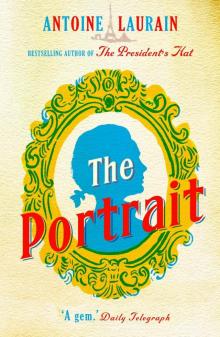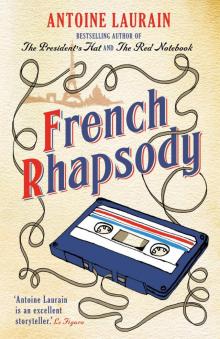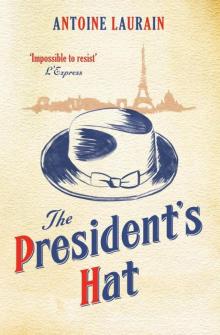- Home
- Antoine Laurain
French Rhapsody Page 17
French Rhapsody Read online
Page 17
François Larnier found himself entrusted, as he had wished, with the mighty task of representing his party at the presidential elections. The opposition, which had no desire to go through the same nightmare and could already sense that its primaries had got off to a bad start, held a meeting at which it was decided by one vote that the primaries would be called off. Meanwhile the Front National continually condemned its adversaries’ tricks and strategies, while presenting itself as a model of unity and integrity – the only party capable of rallying round one candidate, without questions needing to be asked of anyone. This was how the political landscape looked when the man who still came top when voters were asked, ‘Which person in a position of responsibility is best able to govern France in the years to come?’ announced his decision to stand. Politically independent with no party allegiance, surrounded only by a small group going by the name of Union for the Republic, JBM began his campaign.
The very next day, a commentator – quite accurately – compared the political class to ‘a flight of crazed and screeching swallows, circling above the garden of France a quarter of an hour before the storm hits’. Descending into panic, none of the parties were able to come out with a clear and measured response to the announcement of this unconventional candidacy. The opposition – now with six candidates, all issuing completely contradictory statements – was displaying almost unprecedented levels of chaos and incompetence. It was becoming ever clearer that no citizen wished to put the country’s future, and that of its nuclear force, in the hands of one of these stressed, confused men who no longer even seemed able to answer questions from journalists.
‘Underground cabinets’ were formed within the parties with the express purpose of smearing JBM, but the Arcadia boss was without a blemish: no lavish work carried out on his offices; no outlandish restaurant bills; no scandalous spending on artworks, private jet bills, obscenely expensive holidays in five-star hotels, hidden bank accounts. As a matter of fact, there were only four things that could be held against him:
– His marriage to a rich woman – but there was no law against this, and his own fortune was not far off that of the Caténac heir.
– His decision to drive an American car, a Lincoln – a matter of taste, and he had paid for it out of his own account, so it was an item of personal property.
– His Breguet chronometer watch – the brand was one of the most respectable around, and the most highly respected by experts. What was more, there were photographs to prove that he had worn the same one for the past twenty years.
– His impressive collection of cufflinks. This innocent obsession could hardly be classed a mortal sin – and barely even a luxury.
Money, scandal, sex, drugs: there was no story.
Though the underground cabinets had a tip-off pointing them towards JBM’s brother’s theatrically staged suicide in the window of Au Temps Passé, it was mutually agreed, without the need for discussion, that there was no way they were going to bring it up. Not that they felt any particular sense of respect for the dead, but exploiting the tragedy to harm JBM risked backfiring: the suicide of a loved one was no laughing matter. Whatever the circumstances, an event like that called for silence and compassion. ‘We’ve got nothing, nothing!’ despaired one of the leaders of these cabinets. Even Domitile Kavanski, who usually charged a fortune for an hour of her time, had decided to work for him for free since his appearance on The Big Debate. The agreement she had signed with JBM was clear: her advice was ‘given free of charge and no financial transaction is involved’. As far as she was concerned, entering the history books was enough; it didn’t need to come with a cheque.
The same people also tried to dig up dirt on Aurore, but again found nothing to use against her. A young woman from Burgundy whose mother ran a hotel and whose father, who was divorced from the mother and had died five years earlier, had been a wine merchant. A brother who also worked in the wine industry, but at a lower level than his father. Aurore Delfer’s brilliant career had led her to JBM. Full stop. Having never brought out an album, the existence of the Holograms escaped their attention completely. Though they had managed to find an impressive number of Aurore’s past lovers, a figure that was not in proportion to the length of the relationship – a fact which made many of them salivate over the young blonde – it went no further than that. For a time, they dreamt up the possibility of an affair between JBM and his PA, but, there again, they drew a blank. Ironically enough, one of these reports contained the following line: ‘Though their relationship sometimes goes beyond the purely professional according to our sources, the age difference between them means that they have something of a father–daughter dynamic. Nothing untoward, no grounds for attack.’
‘We may as well try to open a safe with a toothpick,’ a member of one of the underground cabinets summed it up nicely before leaving the room. Almost all the party councillors put discreet feelers out towards the Union for the Republic. Domitile Kavanski sifted out the opportunists and filed their details in one of three folders on her computer: ‘Scumbag’, ‘Dead loss’, ‘Depends what he can give us’.
JBM didn’t hold a single rally – ‘old-fashioned, so yesterday, pointless at the national level’, according to Domitile – and communicated solely through the press, on TV, radio and online. The time came for the last official polls before the election. The final estimates of the pollsters put him well ahead in the first round of voting, without a clear picture of how the rest of the votes would be spread; the traditional right, left and the FN all seemed to be on level pegging. One thing was for certain: no party could catch JBM after his four-hour phone-in with Jean-Jacques Bourdin on RMC radio which had attracted nine million listeners.
On the night of the first round of the election, newsrooms were buzzing and the atmosphere was electric in television studios, where the presenters exchanged looks, eyes sparkling, as the leading lights of the traditional parties trickled in, pale-faced. Finally, at 7.59 p.m., the countdown to the results began. At exactly eight o’clock, the thunderbolt that struck the Élysée was way more powerful than a 100-million-volt flash of lightning: JBM had been elected in the first round with 50.04 per cent of the votes, blowing apart the political currents that had held sway since the end of the war with the power of a supernova. For the first time in history, there would be no second round of the election. The traditional right, the Front National and the left had finished way behind, in that order but with almost nothing between them, none securing more than 15 per cent of the vote, the variations statistically insignificant. The other parties classified as ‘alternative’ were left to collect the crumbs.
The Republicans announced their dissolution in the days that followed, and the main leaders of the traditional right retired from politics. The party was reborn at the instigation of the young guard of centrists, under the new name WTC (We The Centrists). Its defining feature was resistance to change. The Socialists decided to change their name and eventually to split into three distinct parties: TSL (The Social Liberals), TL (The Left), and DP (Democracy and Progress), which tore one another to pieces until there was nothing left. Meanwhile, the far right had also taken a beating. A rallying call sent out at a big demonstration had fallen flat and its support gradually dwindled over subsequent years until it had fallen back to the levels of its political beginnings. The streamlined national unity government put in place by JBM got to work and the month after the election set out its vision for a new society. The end of the Fifth Republic was ratified by the Constitutional Council. The Sixth Republic was established that September. A year later, France’s economy was growing at the rate of 3.2 per cent and was forecast to exceed 4.7 per cent the following year. ‘I’m not a politician, I’m just a link in a chain whose duty is to make a change in society. We’re going to do it together. We’ll hold on to our values and everything we have defended for centuries, but, for the first time, we’re going to face up to the present and the future. Don’t be afraid, enjoy the ride.’ The
se were JBM’s defining words during the first speech of his first five-year term.
The early days of the Sixth Republic rocked to the sound of a curious song. The craze kicked off in Finland, where a small group of rock fans nostalgic for the eighties got hold of a track that had been posted on a free streaming site the day before and began to share it on social media. Two days later, there were 458 comments in languages as diverse as English, Spanish, Arabic, Portuguese and Chinese on the web page, with no mention of the name of the group or even the song title. Record companies started going into a frenzy at the end of the song’s first week online, when – with no music video, only a visual sound wave to accompany it – the track had already been played 17,362,000 times. They contacted pretty much every group imaginable to find out if any of them was the source of the hit song. All were honest enough to reply in the negative.
When, a month later, the song hit ninety-eight million plays, articles began cropping up in newspapers the world over, and a whole array of crazy theories began to circulate on the Net. The most persistent rumour, which went round for several weeks, was that the song was an unreleased David Bowie track, on which the singer’s voice had been slightly modified. No sooner had that rumour died down than other theories began to emerge. Some suggested the song could be an unreleased Eurythmics track from the ‘Sweet Dreams’ era, or an experiment by Giorgio Moroder, who was working with Blondie around that time. Annie Lennox issued a statement via her agent expressing her admiration for the song, but denying the vocals were hers. Likewise Moroder, who praised the melody but claimed not to have written it. More hypotheses flew around: a lost track by Depeche Mode, Propaganda, REM or Roxy Music. Anonymous internet posters even claimed to have been present at the recording. A ghost of the eighties, rock critic Yves Adrien – a music legend whom many were surprised to find was still alive – broke his silence to share his verdict that the song was ‘obviously French, really well produced at some point between 1980 and 1984, most likely by an unknown group that broke up years ago and has been lost in the sands of time’.
A giant of the global cyber machine, the teenage dream they had made one fine afternoon in July 1983 now had a life of its own and with every download was born again, becoming ever stronger. No fewer than sixty-seven cover versions were produced around the world. From his home in Thailand, Frédéric Lejeune tried to take the credit for the keyboard playing on the track, but his voice was lost amid the clamour of comments online – and anyone who did notice took him for a fantasist. Bérengère was content to smile to herself whenever the song came on the radio. Stan Lepelle was initially not quite sure how to react, before deciding not to make any comment on a part of his life that risked muddying the waters and detracting from his reputation as a modern artist – in any case, he was too busy working on his upcoming retrospective at MOMA in New York. As for JBM, when asked at a press conference about the hit tune that France and the rest of the world were dancing to, he simply replied with a cat-like smile that there must be something about the song that rang true, that we were all made ‘of the stuff of dreams and it’s up to us to make those dreams come true’. The camera panned round to the general secretary of the Élysée, Aurore Delfer, and caught her winking knowingly at the president.
Alain had uploaded the song in an internet café thinking people might enjoy it and, crucially, that no one would ever find out where it had come from or who was behind it, nor ever make a centime from it.
That was enough to make him happy.
Reading Group Questions
(Download at www.gallicbooks.com)
A rhapsody, in musical terms, is a free-flowing, emotional piece of music with plenty of variation in tone and structure. Its theme is often about a place. How accurately does this definition fit the novel? What is the effect of the variety of voices included in French Rhapsody, and what do they tell us about the state of the French nation today?
To what extent is Antoine Laurain’s writing nostalgic for the past?
French Rhapsody delves into the worlds of music and art, both classical and contemporary. How does Laurain weave different art forms together? To what extent is the novel a critique of the modern creative scene?
Can French Rhapsody be read as a political novel? What does it tell us about those who long for power?
Antoine Laurain collects antiques and used to work for an antique dealer. His novels often focus around a quest to find a lost object – the talismanic hat in The President’s Hat, the handbag and the notebook it contains in The Red Notebook, the missing demo tape in French Rhapsody. What do his novels tell us about the meaning and power of inanimate objects?
A reviewer for French newspaper Le Figaro compares Antoine Laurain’s comic skill to that of Molière, who understood that even the most absurd or grotesque characters should be likeable. Did you feel any sympathy for Vaugan?
And finally … would you vote for JBM for president?
The President’s Hat
Antoine Laurain
translated by Gallic Books
Dining alone in an elegant Parisian brasserie, accountant Daniel Mercier can hardly believe his eyes when President François Mitterrand sits down to eat at the table next to him.
After the presidential party has gone, Daniel discovers that Mitterrand’s black felt hat has been left behind. After a few moments’ soul-searching, Daniel decides to keep the hat as a souvenir of an extraordinary evening. It’s a perfect fit, and as he leaves the restaurant Daniel begins to feel somehow … different.
ISBN: 9781908313478
e-ISBN: 9781908313577
The Red Notebook
Antoine Laurain
translated by Emily Boyce and Jane Aitken
Bookseller Laurent Letellier comes across an abandoned handbag on a Parisian street, and feels impelled to return it to its owner.
The bag contains no money, phone or contact information. But a small red notebook with handwritten thoughts and jottings reveals a person that Laurent would very much like to meet.
Without even a name to go on, and only a few of her possessions to help him, how is he to find one woman in a city of millions?
ISBN: 9781908313867
e-ISBN: 9781908313874
About the Author
Antoine Laurain was born in Paris and is a journalist, antiques collector and award-winning author. His novels include The President’s Hat and The Red Notebook.
Jane Aitken is a publisher and translator from the French.
Emily Boyce is in-house translator and editor at Gallic Books.
Copyright
This book is published with support from the 'Programmes d'aide à la publication' of the Institut français
First published in France as Rhapsodie française
by Éditions Flammarion
Copyright © Éditions Flammarion, 2016
First published in Great Britain in 2016
by Gallic Books, 59 Ebury Street,
London, SW1W 0NZ
This ebook edition first published in 2016
All rights reserved
© Gallic Books, 2016
The right of Antoine Laurain to be identified as author of this work has been asserted in accordance with Section 77 of the Copyright, Designs and Patents Act 1988
This ebook is copyright material and must not be copied, reproduced, transferred, distributed, leased, licensed or publicly performed or used in any way except as specifically permitted in writing by the publishers, as allowed under the terms and conditions under which it was purchased or as strictly permitted by applicable copyright law. Any unauthorised distribution or use of this text may be a direct infringement of the author’s and publisher’s rights, and those responsible may be liable in law accordingly.
ISBN 9781910477380 epub
The best of French in English … on eBook
&nbs
p;

 The Portrait
The Portrait French Rhapsody
French Rhapsody The President's Hat
The President's Hat